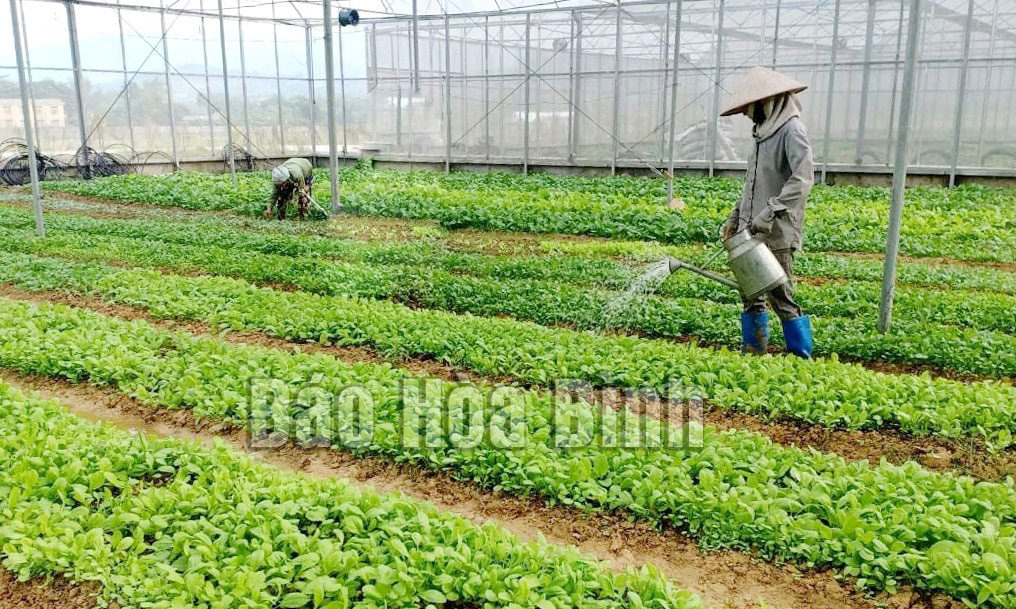
(HBO) – In recent years, women in Luong Son district has embarked on producing clean and safe agricultural products, which is considered a sustainable livelihood that has helped change their mindset and bring into play their creativity to enrich themselves.

The
agriculture - forestry - irrigation cooperative in Tan Vinh commune has
developed a safe vegetable farming model in Dong Chui hamlet to turn arid areas
into vegetable fields, generating high economic benefits for its members.
Hoang Thi Bich Thuy, head of the Women’s Union
of Tan Vinh commune, said the safe vegetable production model of the Tan Vinh
agriculture - forestry - irrigation cooperative in Dong Chui hamlet is part of
the Vietnam Irrigated Agricultural Improvement Project, carried out on 1,500
sq.m. of farmland in Hoa Binh province. It has seen the participation of 30
member women.
To apply this model, member households have
received training in safe vegetable cultivation under VietGAP standards, taken
part in exhibitions, and been connected with sellers. The cooperative has
assisted them to ink contracts with two purchasers in Luong Son Industrial
Park, three in Hoa Binh city, and two in Hanoi.
Thanks to land reclamation efforts, vegetable
output has reached 600 - 800kg per week and about 40 tonnes per year,
generating nearly 500 million VND (21,800 USD) in income.
Women’s unions at all levels in Luong Son
district has opened many training courses on safe vegetable production while
coordinating with the farmers’ union to establish safe and organic vegetable
farming groups.
In the first half of 2021, women’s unions in
local communes organised three courses to transfer advanced techniques in
citrus tree cultivation and afforestation to 120 women.
Besides, the Luong Son Women’s Union has also
implemented Project 939 on assisting women to start a business and some other
tasks helping them to develop livelihoods./.
More than just an information technology teacher, Bui Van Nien is an inspiring figure who has nurtured the scientific curiosity and creative spirit of students in Vietnam’s ethnic minority communities.
Da Bac is the most disadvantaged mountainous district in Hoa Binh province, with ethnic minorities accounting for about 90% of its population. Over the past years, the district has mobilised resources to implement ethnic policies to improve the quality of life of local people.
In recent years, Hoa Binh province has consistently prioritised the protection, care, and education of children, particularly those from ethnic minorities and disadvantaged backgrounds, by creating a safe, healthy, and nurturing environment for their all-round development.
The Steering Committee for Tobacco Harm Prevention and Control of Hoa Binh province, in coordination with the Tobacco Harm Prevention and Control Fund, held a ceremony on May 28 in response to the World No Tobacco Day (May 31) and the National No Tobacco Week (from May 25 to 31). The event was chaired by Nguyen Van Toan, Standing Vice Chairman of the provincial People’s Committee and head of the Steering Committee.
Since 2021, the Center for Industrial Promotion and Industrial Development Consulting (CIIDC) under the Department of Industry and Trade has been implementing a school lighting model as part of the plan for using energy efficiently and economically in Hoa Binh Province in the pẻiod of 2021 - 2025. This model not only aims to improve the learning conditions and enhance the education quality, but it also promotes the message of energy saving, energy security, environmental protection and contributes to the goals of socio-economic development.
In the 2024 - 2025 school year, the entire Hoa Binh provincial education sector includes 520 educational institutions and schools. Among them are 13 ethnic boarding schools with 153 classes and 4,487 students. Four of these schools have met national standards, reaching 30.7 percent.



